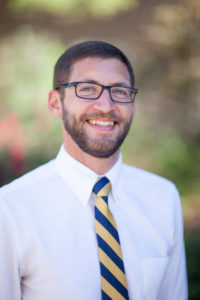![]()
E-mail: gfonteno@nd.edu
Language: French
Location of Study: Montreal, Quebec, Canada
Program of Study: EC Montreal
Sponsors: Center for the Study of Languages and Cultures
Blog URL: http://sites.nd.edu/sla2016/author/gfonteno/
A brief personal bio:
I am a Ph.D. candidate in the Department of History. Originally from Southwest Louisiana, I received my undergraduate degree from Loyola University New Orleans before moving to South Bend. My dissertation explores the political culture of the French Empire in the second half of the eighteenth century, particularly in France’s former colonies in North America, Canada and Louisiana. After my summer studying French, I will stay in Montreal for the 2016-2017 academic year to conduct archival research and continue to write my dissertation.
Why this summer language abroad opportunity is important to me:
I am thrilled to receive the SLA grant as it provides me with a unique opportunity to improve my communication skills in French beyond that which I already possess. For my research, a reading knowledge of French is an absolute must; however, having the ability to speak French well opens up a range of opportunities to collaborate and learn from French-language scholars around the world, as well as opening career paths unavailable to American historians only fluent in English. I also come from a historically francophone family and region of the United States. Though fewer and fewer claim French as their first language (myself and my parents included), in the last several decades, many with francophone ancestors have sought to revive use of the French language, creating many new and exciting opportunities for those with French-language skills. With the combination of my research interests and knowledge of the language, I will be well-placed to take an active role in the “French renaissance” of Louisiana.
What I hope to achieve as a result of this summer study abroad experience:
With the SLA grant, I will build upon my existing knowledge of French to develop my communication skills, both spoken and written, in the language. My goal is to build a level of competency that will allow me to communicate and engage in academic discussion with French and French-Canadian scholarly peers who engage in research related to my own. As part of that goal, I expect to acquire the skills, vocabulary necessary to understand and make myself understood in most normal social situations in French. As I will be living in Montreal next year, having that ability will allow me to engage with the culture of French Canada and make the most of my experience living there, as well as communicate that experience back to my peers and others interested when I return both to Notre Dame and home. I also hope to increase the speed at which I can read in French, which will enable me to work much more efficiently on my research and dissertation.
My specific learning goals for language and intercultural learning this summer:
- By the end of summer, I will be able to engage in and sustain conversation with native French speakers on a range of social, political, and intellectual topics arising in day-to-day conversation, as well as handle most situations that arise in everyday activities.
- I will be able to describe my research, the questions that I am addressing in my dissertation, as well as the theoretical and structural principles underpinning my project, to francophone scholars, and engage in the academic discussions that may result.
- By the end of the summer, I will develop the research skills necessary to quickly process and comprehend large amounts of French language archival material, as well as to analyze structure, content, and word choice of the documents.
My plan for maximizing my international language learning experience:
Since I already have some basic communications abilities in French, I plan to maximize my experience in Montreal by putting those to the test as soon as I arrive. By trying, and probably failing, I can learn what I don’t know, and what I need to work on improving. In the meantime, I’ve started to listen to Montreal news radio while I cook, clean, or do other tasks around the house to familiarize myself with the language as spoken in Canada and in order to familiarize myself with the major issues being discussed in Montreal at the moment. Doing this, I hope, will allow me to engage with native speakers with as much knowledge as possible, using what skills I already possess.
